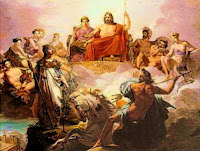
In our logical dualistic minds, we constantly separate fact from fiction, truth from lies, and right from wrong and are bound to exclude one from the other. In other words, A is A and cannot be not-A at the same time. You cannot have, from a logical point of view, two contradictory statements that are equally right.
This belief, which is the backbone of science and technology, may stumble upon some difficulties in other, rather shady areas. One such would be the field of ethics. Sometimes it is not so easy to know which path to take, and both actions could be the “right” thing to do. In those cases, we may use our utilitarian guidelines, namely to find the choice that is the best option for the largest group of people.
In other areas, such as our personal lives, we tend to make decisions based on either what “feels” right, or we bring out our list of pros and cons. But what about religious issues? Are the answers clear-cut? Can we say that one religion is more correct than others? Does logic apply to those realms as well? Is there an afterlife – or is there none? Do we accept "yes-and-no" and "yes, but ..." answers?
The problem is that our mind seems incapable or unwilling of accepting and embracing two contradictory statements. Either you are lying or you are telling the truth, now which one is it?
But then again “truth” can be a relative and subjective matter. What is true to me, to my experience of the world, may directly oppose your version. If I am depressed and you are happy, our views of the same event are diametrically opposed. And when it comes to feelings, can we not feel both sad and happy at the same time? We often cry in both situations, so sometimes it is hard to distinguish one from the other.
There is a bizarre conclusion I would like to propose, one that may exasperate many logically and scientifically trained and inclined minds: What if all religions are equally right and wrong?
Imagine the following scenario. Romans used to worship Roman gods. For them, those gods, Jupiter and Apollo were “real”; they existed. We might say they exist in the same way fictitious entities like “Harry Potter” or “James Bond” exist. Do they really exist? No. Well, yes. Kinda. They exist in people's minds but not physically, right?
What if there is another plane of existence? Somewhere where time and space have not been born yet, in a world of twilight zone meets pre-Big Bang. What if in this world, what you believe is not only true for you personally but becomes actually true through the simple act of faith and imagination.
What if God both exists and does not exist simply based on what we think, regardless of actual physical reality? So atheists will find no God, while theists would claim that they were also right after all. To each his or her own.
This must have been the confusion that the protagonist in Andrei Tarkovsky's Solaris faced. At that space station, one's imagination became reality. As a result, he met the physical embodiment of his now-dead wife. A hallucination? Perhaps, but she (it?) was there and felt “real” to the touch. Seeing was believing, no? If what we can see is not real and what we cannot see is not real either, what else is there?
My proposition is that the Romans were right in their unwavering belief, so is a Christian, a Buddhist, a Muslim, and a Hindu. The world is perhaps less objective than we think. Faith can move more than mountains. Imagination is more important than knowledge. We are the creators, each one of us, not only of our own lives but perhaps of the cosmos itself.

5 comments:
Thought I am not religious and typically do not believe in anyone's God, I think it is possible that a being exists and that Muslims, Christians, Jews and even Buddhists, Hindus and scientologists see aspects of some being and do not realize that it is the same entity.
I have not considered that reality as we know it is an illusion and at once exposes a reality that we all see in our own way (until now).
Your position, which would be discarded by many, I think, makes as much sense as anything else. The truth is mysterious and at this point unknowable.
Your blog is one of my favorites, and one I visit often, because you always surprise me with bizarre ideas that make as much sense as commonly accepted facts.
I agree with your thesis. To operate day to day in this complicated world we need a point of view and we thrive on metaphor: something which can be grasped in the imagination, as opposed to some abstract reasoning which isn’t possible without special training in academic disciplines, and isn’t universally accepted even then.
Thank you very much for your comments!
Yes, John, the problem is that everyone wants to claim a part of this "entity" or being. Just like putting flags on the moon (or anywhere for that matter) does not really signify ownership.
Absolutely, Vincent. As Einstein said Imagination is more important than knowledge. And this is coming from a genius and renowned scientist.
well will plz tell me dat is imagination important or knowledge.
In "Nostalgia for the Light" there was a really interesting quote which just came to mind...paraphrasing here but it basically said that religion and science are essentially seeking answers to the same questions in different ways. As an atheist the only problem I have is religion's claim to have those answers...but I see the universality of human civilization CONSISTENTLY having some sort of religion and it makes me wonder. Also agree with John than anything really can exist!
Post a Comment